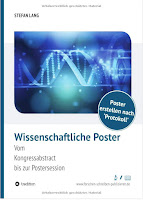It’s time for you monthly anthology of quick hits on things that are somehow tangentially related to poster, poster sessions, and conferences!
• • • • •
It’s in German. Alas, I do not read German.
Stefan Lang was written a guide to conference posters called Wissenschaftliche Poster: Vom Kongressabstract bis zur Postersession. He has a blog post describing the book. An excerpt (using of Google Translate):
In my book you will find neither a theoretical theory of colours nor the rules of the golden ratio. Rather, it’s about how you should go about doing things practically to create a scientific poster—a poster that doesn’t just show data, but presents research results. My guide therefore deals with the following questions:
- Selection of information: Which facts belong on the poster?
- Core message and keywords: Where do I place my most important statements?
- Professional tools or PowerPoint: How do I implement my ideas?
- Reader guidance: How do I guide the viewer through difficult material?
- Leave nothing to chance: How do I prepare for the congress ?
If you are reading this blog post in German using Google Translate, you may want to check out this book instead of mine. If you do, please tell me more about it!
• • • • •
Classical music is tricky to categorize. There are who knows how many recordings of Holst’s The Planets, for instance. (Wikipedia says there are at least 80 recordings of The Planets.) How will a classical musical fan search for the recording they want? The composer? The conductor? The year the music was written or the year it was recorded?
The selection task is so different from typical contemporary pop music that it makes more sense for there to be a dedicated app.
Journal articles are like classical music: they revel in rich, detailed information. Posters are like pop music: the information you need is streamlined and more suitable for quick browsing.
Char sure doesn’t like the icon, though.
• • • • •
I’m not sure what a conference abstract from 10 years ago popped up in my alerts, but it did. If anyone was in Japan in 2012 and saw this presentation about tracking people in poster sessions, let me know. Excerpt:
This paper proposes a new real-time 3-D head shape and pose estimation method for analyzing inter- actions in poster sessions. ... We implement a proof-of-concept system and demonstrate our method can estimate shapes and poses of two unknown person in real-time.
• • • • •
Berkeley Mono typeface is inspired by classic computer monitors.
Hat tip to Edward Tufte.• • • • •
Poster projects are fun!
At least, 95% of students in the paper below agreed that poster projects are fun.
Here’s a paper on the use of posters for teaching.
Cuenca Gotor V et al. 2022. Project-based learning using scientific poster as a tool for learning and acquisition of skills in physics subjects of engineering bachelor’s degrees. A: SEFI 50th Annual conference of The European Society for Engineering Education. Barcelona: Universitat Politècnica de Catalunya, p. 1113-1121. https://doi.org/5821/conference-9788412322262.1138
• • • • •
Thanks for joining me this month!



.png)





No comments:
Post a Comment